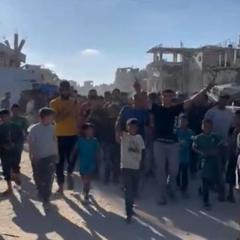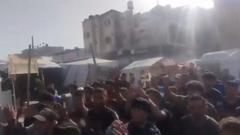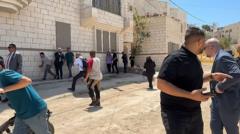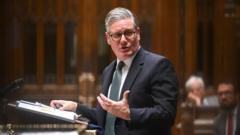As Israel's offensive in Gaza intensifies, prominent dissenting voices are emerging within the nation, calling for a reassessment of military strategy and urging the government to prioritize the return of hostages and humanitarian concerns.
Israeli Voices Dissent as Sentiment Shifts on Gaza Conflict

Israeli Voices Dissent as Sentiment Shifts on Gaza Conflict
Public discontent over Israel's military actions in Gaza grows, reflecting a dramatic change in attitudes among citizens and politicians.
As Israel's war in Gaza escalates, anger and discontent among citizens are palpable as voices advocating for peace and reassessment emerge. Former IDF deputy commander, Yair Golan, ignited controversy on Monday with comments suggesting that Israel risks becoming a "pariah state" by conducting its operations against civilians. Golan's remarks reflect a growing sentiment among Israelis calling for a more humane approach to the conflict.
In response, Prime Minister Benjamin Netanyahu labeled Golan's comments as "blood libel." Yet, further expressing dissatisfaction, former Defense Minister Moshe Ya’alon claimed that the ongoing violence reflects a governmental strategy focused on maintaining power rather than ethical conduct in warfare. As public opinion shifts, a recent Channel 12 poll revealed that 61% of Israelis support ceasing hostilities in favor of negotiating the release of hostages—a stark contrast to the 25% advocating for expanded military actions.
Protests have surged, with groups like Standing Together leading demonstrations against the Israeli offensive by highlighting the humanitarian crisis in Gaza. Recent gatherings saw protesters compelled to carry photographs of Palestinian children impacted by Israeli airstrikes. The momentum of the peace movement appears to be growing, as expressed by activist Uri Weltmann, who underscored the risks continued conflict poses to both Palestinian civilians and Israeli hostages.
Despite the dissent, substantial divisions remain within Israeli society regarding the conflict. Some citizens, like Gideon Hashavit, continue to support military actions citing a belief that Gazans have contributed to their plight by aligning with Hamas. Meanwhile, international reactions to the situation are intensifying. The UK has increased pressure through sanctions against what it deems extreme elements in Israeli society, suspending discussions on trade agreements due to the conflict's humanitarian implications.
As nations like the UK, France, and Canada voice strong condemnation of Israel's actions, the atmosphere among Israeli civilians appears to be shifting. With many expressing a desire for peace and a resolution oriented towards humanitarian needs, the dialogue around the conflict is entering a critical phase, reflecting a significant pivot in public sentiment both domestically and abroad.



















